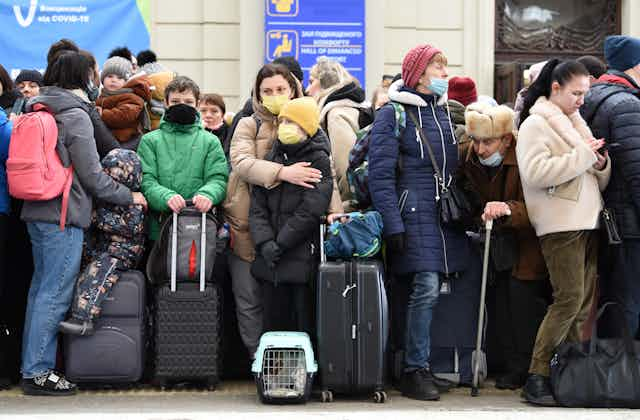The UK government has announced a scheme allowing people to open up their homes to refugees fleeing the war in Ukraine. “Homes for Ukraine” will allow individuals, charities and community groups to take Ukrainians into their homes, rent-free for a minimum of six months. Prime Minister Boris Johnson said “historically and by nature” the British people are “very generous, open and welcoming”. In return for their kindness, hosts will be awarded a monthly “thank you” payment of £350.
Since the Syrian war began in 2011, I have researched and worked with Syrian refugees who have fled to neighbouring countries such as Jordan, and also those who have been resettled in the UK and Europe. I have witnessed firsthand how the UK and Europe has welcomed refugees but has struggled to integrate them into their host communities, particularly when there are language and religious barriers.
Resettlement in any country creates challenging situations, both for the refugees seeking a new life, and for the communities in which they are resettled. Many in the host communities are sympathetic towards refugees, while simultaneously fearing what foreign migrants moving into their towns and villages might mean for their local cultural and economic environment.
Schemes that involve staying with locals are not a new concept, and have proven to be both highly effective for refugees’ integration and eye opening for hosts. In the UK, charitable organisations such as Refugees at Home, City of Sanctuary, Refugee Action and The Buddy Project work to match refugees with hosts to provide the best chance at successful integration. It is not yet known if these organisations will be involved in the government scheme.
In 2017, my colleagues and I conducted a qualitative study on Takecarebnb, an organisation that matches refugees looking for temporary accommodation with volunteers in the Netherlands. We observed Syrian refugees’ experiences living with host families and found the scheme had benefits for both refugees and their hosts.
The organisation is now permanently backed by the Dutch government. The success of Takecarebnb shows how home-stay schemes can support refugees’ resettlement and integration, while easing host communities’ anxieties and even changing their perceptions about refugees.
Findings from my research with refugees in Jordan, UK and the Netherlands can provide some guidance for people thinking about opening their homes to a Ukrainian refugee.
Read more: 'Friends for life': how living with locals helped refugees feel at home in a new country
1. More than just a roof over someone’s head
Welcoming a refugee into your home is about much more than providing a bed. Hosts become the key to refugees’ integration in a new society after being ripped from their home. Hosts do this by guiding refugees towards educational institutions and introducing them to a network of local people and potential employment opportunities. Other invaluable day-to-day tasks include providing them with a safe environment, explaining local traditions, supporting language development and interpreting letters and emails.
2. Supporting people in limbo
Our research made clear that living in a state of limbo – where one’s return date home is unknown – is one of the hardest issues for refugees. Hosts and volunteers can boost the refugee’s sense of belonging by asking about their homeland, learning about their history, traditions and food while teaching them about local culture. This form of cultural exchange supports refugees’ identity struggles during forcible displacement.
Another way hosts can support refugees during this time is through art and craftwork. Making art can be a profound way of connecting with others and with one’s own experiences, enabling people to express what cannot be put into words, and relate to each other in the process. Our research shows these activities can be therapeutic for refugees in limbo, allowing them to connect with their national identity while developing a sense of belonging in their new community.
3. Hosting is not a one-way street
Hosting is also an investment and enrichment for the host’s own lives. The hosts in our studies show that as months go by they feel a great sense of connection and companionship, with many stating they had found “friends for life”. For those who had children in the household, they found that their childrens’ eyes had been opened to a whole new world, learning a new language and culture and becoming more tolerant of those who are different from them.

What the refugee crisis has shown us in recent years, and particularly over the last few weeks, is that there are countless people willing to support refugees by opening up their homes to them – they just need a platform that enables them to do so. This time, the UK government is supporting this scheme rather than leaving it to charities to organise and fund it. Johnson said this would be the “best thing for refugees, because they want a scheme that is safe, that is welcoming and that works”.
However, as wars in Syria, Afghanistan and now Ukraine continue indefinitely, relying on a bottom-up wave of help and hospitality could eventually run out of steam. The UK and other governments should develop long term plans to support refugee integration rather than leaving this enormous responsibility to the public and risk exploiting their generosity.

